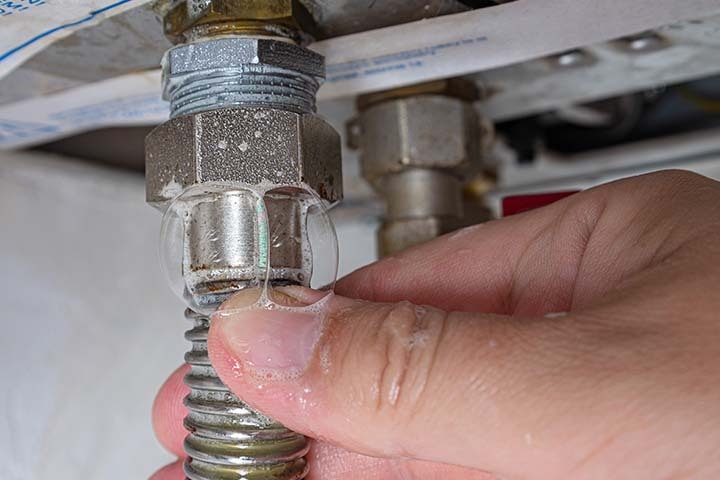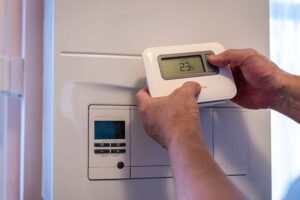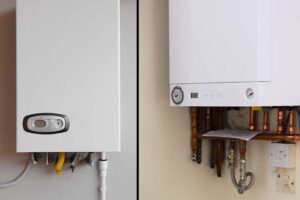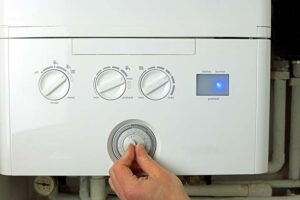A leaking boiler might not look scary. Just a few drops, maybe a small puddle. But don’t be fooled — even a small leak can mean big trouble. So, yes, a leaking boiler can be an emergency.
Boilers are closed systems. They’re not designed to leak. So, if yours is, something’s amiss. It might be a loose valve. Or something worse, such as a faulty part or pressure issue.
If left unattended, a leak can ruin your floor, walls, or even the boiler itself. In the worst case, it could be hazardous.
Leaking Boiler and Its Signs
A leaking boiler does not necessarily have loud alarms or flashing lights. Occasionally, it is just a drip in one place or a puddle in another. Small signs, however, can spell big trouble. Boilers may leak water or gas.
Gas leaks are extremely dangerous. They can lead to fires, explosions, or carbon monoxide poisoning. And the most frightening thing? Carbon monoxide is odorless and colorless, so you won’t even realize it’s present. That is why a carbon monoxide alarm should be in every home. It can save lives.
Water leaks might not be emergencies, but they can create huge issues nonetheless. Leaking water over time can ruin your walls or floors, create mould, and even make individuals slip and fall.
Boiler Gas Leak Signs
- You can smell gas (a pungent, eggy odor).
- You become dizzy, ill, or experience headaches indoors.
- Your boiler flame goes yellow rather than blue.
- You notice hissing or unusual noises around the boiler.
If you spot any of these, switch off the gas and ring the National Gas Emergency Service on 0800 111 999 immediately. Don’t delay.
Is a Leaking Boiler an Emergency?
Yes, it is – particularly if you don’t know why it’s leaking. A tiny water leak may not look serious. You may actually want to stick a towel under it and ignore it. But that’s not advisable.
Water within a boiler system equates to pressure issues or faulty components. If it continues to deteriorate, your heating will cease to function. Or the boiler may completely fail.
If you suspect it’s a gas leak, that is an actual emergency. Don’t hesitate. Ring the gas emergency number immediately. Even if it is just water, you still require a Gas Safe registered engineer to inspect it. Boilers are complicated and hazardous if treated improperly.
Can a Leaking Boiler Explode?
It’s extremely unlikely — but yes, it can. If the pressure gets too high or there’s a gas leak, there’s a slight risk of an explosion. That’s why new boilers have safety devices incorporated.
But don’t neglect leaks. They’re an indication that something’s deeply wrong. If your boiler is leaking water or you can smell gas, turn it off and contact a gas-safe engineer.
Why Is My Boiler Leaking Water from Underneath?
There are several typical reasons that a boiler may leak water, particularly from underneath.
1. Corroded pipes
Water and soil within your system can erode the metal pipes over time. This is corrosion. Holes can form slowly, and water begins to seep out.
2. Loose joints or broken seals
Boilers heat up and cool down a lot. That causes the parts to expand and contract. Eventually, this wears out seals and joints, leading to leaks.
3. Badly fitted pipes
If your boiler is new, corrosion won’t be an issue. The leak could be caused by poorly fitted pipework. Occasionally, joints are not sealed correctly.
4. High pressure
Your boiler contains a pressure-controlling valve. When pressure builds too high, water can escape the small pipe through the wall outside your home. That’s your pressure relief valve working — but it indicates that something is wrong.
5. Wear and tear
Boilers don’t mean to last forever. Over time, parts of them wear out. Even better-than-average boilers will begin leaking after a decade or so.
6. Internal corrosion
Within the boiler, metal components such as the heat exchanger may rust. Rusting makes the metal weaker and allows water to leak out. It’s not unusual in older boilers.
Is it Dangerous if My Boiler is Leaking Water?
They can. Water leaks do not have to be scary, but they can do a lot of damage to your home. Slippery floors, mildew, or even electrical issues are all possibilities.
And additionally, leaks might be a sign of something deeper going wrong within the boiler. The leak in itself does not have to blow up or catch fire, but whatever is causing the leak can be dangerous if not fixed.
Why are Boiler Leaks so Dangerous?
A small leak might not look so threatening, but it can quickly become a gigantic issue. Here’s why you must never overlook it:
- Mould and damp: Leaks leave your property damp. Damp conditions are perfect for mould and fungi to grow. These can cause health issues like coughing, breathing problems, or trigger asthma.
- Damage to your property: Water seeps into your floors and walls. Eventually, this results in warped wood, stains, and structural damage. When it freezes outside, the water freezes and causes wooden support beams to crack.
- Deteriorating boiler issues: A leak might mean there is something wrong internally with your boiler. Unless fixed, it will ultimately end up damaging other parts—like electrical parts—and cost more to fix in the future.
Can I Use My Boiler if it's Leaking Water?
No, it is not safe. If you see water dripping, turn off the boiler right away. Also, switch off the central heating and water supply. This avoids further damage.
Place a bucket or towel under the leak to catch drips. Wipe away any water around it so that it can’t cause you to slip or damage anything.
If you suspect there’s a gas leak, turn off the gas at the isolation valve (it’s usually a small lever near your gas meter). Then call the National Gas Emergency Service immediately.
When you’ve made things safe, contact a Gas Safe registered engineer. Do not try to fix the boiler yourself.
What Should I Do If My Boiler Is Leaking Water?
If your boiler is leaking, you need to act fast. A prompt response can prevent extensive damage and make your home safe. Follow these steps:
1. Turn Off the Water Supply
Find your main water shut-off valve. It’s usually where the main pipe enters your home or near the water metre. Rotate the valve in a clockwise direction to shut off the water supply. This will help stop the leak from getting bigger.
2. Turn Off the Boiler
Next, switch off your boiler. You’ll usually find a labelled power switch on or near the boiler. If you’re unsure or can’t reach it safely, call a Gas Safe engineer instead of taking risks.
3. Look for Where the Leak is Coming From
Have a careful look around the boiler. Check for:
- Drips from the boiler or attached pipes
- Puddles of water under the unit
- Damp patches on nearby walls, floors, or pipes
This will help you to sense what is wrong and explain it more clearly to an engineer.
4. Check the Pressure Gauge
On the front of your boiler, there is a pressure gauge.
- If there’s excess pressure (more than 2 bar), the pressure relief valve may be leaking.
- If the pressure is too low, your system may have lost water, or the valve could be faulty.
In either case, it’s best to shut off the boiler until a pro comes to look at it.
5. Know About the Heat Exchanger
The heat exchanger is a key part inside the boiler. Over time, it can crack or corrode, causing hidden leaks. This kind of issue usually needs a professional to fix, so don’t try to open or repair anything yourself.
6. Watch Out for Gas Smells
If you smell gas or hear a hissing sound, get out of the house straight away. Don’t touch any switches or use your phone.
How to Fix a Leaking Boiler?
If your boiler is leaking, don’t try to fix it yourself. It’s always best to call a Gas Safe engineer. Boilers are complex and can be dangerous if handled the wrong way.
But if the leak is minor or from a radiator pipe, give it a try with these:
1. Check the Pipe Joints
If water is dripping from a joint, it is probably loose. Wipe the area around with a cloth. If you think you can do so safely, tighten the joint gradually. Don’t over-tighten — and don’t attempt if you’re not sure.
2. Inspect the Pressure Relief Valve
This valve helps release extra pressure from the boiler. If your boiler pressure is too high, it might leak from this valve. Try adjusting it slightly to lower the pressure. But only do this if you’re comfortable. Otherwise, call a professional.
3. Check for Cracks
Check the valve and other parts around it for cracks or damage. If you notice something that is damaged, the component will have to be replaced. This must be carried out by a gas-safe engineer.
4. Seals and Connections
Worn seals and connections can also lead to leaks. Discovered a loose seal? Tighten gradually. Still leaking? Time to call in a professional heating engineer to fix it.
How Can I Prevent My Boiler From Leaking Again?
Annual boiler maintenance keeps your boiler in tip-top shape and prevents leaks from arising at all. Follow these steps to maintain your boiler in prime working order:
1. Get a Yearly Boiler Service
Get an annual boiler service from a gas-safe engineer. They’ll identify faults, clean them out, and make sure it’s safe and operating economically. This’s one of the best methods of leak early detection.
2. Use a Magnetic Filter
A magnetic filter traps debris (such as rust or metal shavings) before it can damage your system. This keeps the interior of your boiler clean and minimizes the risk of leaks.
3. Do a Chemical Flush
Dirt and limescales can accumulate inside your system over time. A chemical flush cleanses them out and makes your boiler more efficient for longer.
4. Replace Worn Parts
Boiler components such as seals, washers, and valves will eventually wear out. If they begin to leak or crack, replace them immediately. This will prevent small issues from becoming large ones.
By following these easy steps, you can maintain your boiler running — and prevent leak anxiety.
The Bottom Line
An appropriately serviced boiler will heat and protect your home. But when it leaks, breaks, or costs more than it’s worth to fix, then it might be time to replace it. Always have a Gas Safe registered engineer check it out to make sure all is well.
Frequently Asked Questions
A leaking boiler isn’t good. If water is leaking, call an expert straight away. Leaks can cause damage and safety issues.
Yes, a leaking boiler will also cause carbon monoxide problems. That is the reason why one must get any leaks inspected by a professional right away.
A leaking boiler itself will not result in a fire, but water will destroy electrical parts, which will create additional issues. Get it fixed as soon as possible at all times.
Yes, the majority of leaks can be fixed, depending on why they leaked. The best thing is to have the reason diagnosed and fixed by a professional.








